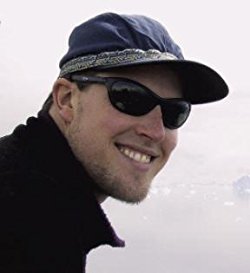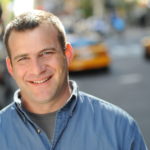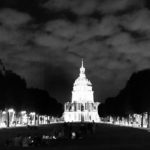During the past decade, Andrew Dean Nystrom has contributed to two dozen Fodor’s and Lonely Planet travel guidebooks, and his work has been translated into a dozen languages. His travel writing first appeared online in 1996 in a weekly column on Tripod.com. Recent assignments have taken him to Antarctica, Bolivia, the Falkland Islands, Mexico, Paraguay — and back to his desk to work on Lonely Planet’s forthcoming Career Break Book. He’s currently on the road researching for a new book about epic North American road trips. When not out rambling, he hangs his hats in a garden cottage straddling a major earthquake fault in Alta (Northern) California.
How did you get started traveling?
My parents started hauling me around the USA in the back of the various ill-equipped vehicles (an underpowered VW Bug through the Rocky Mountains, a canary-yellow Ford Fiesta across Death Valley in the dead of summer without air conditioning, et cetera) at a ripe young age. One of my earliest childhood memories is riding shotgun in a lurching woodie station wagon around the hills of San Francisco while my mom was learning how to drive a standard transmission. My family always seemed to fit at least one major event into each trip, like Expo ’86 in Vancouver, the Calgary Stampede or the New Orleans World’s Fair. Due to my dad’s job, we had moved across country four times by the time I was twelve years old. Each time, I began to look forward more and more to the road trip — and stopping to see my grandmas in Iowa — and less and less to saying goodbye to my friends. Today, my mom is a travel agent but my dad doesn’t care to travel any farther than the nearest fishing hole. I’ve been on the road an average of 10 months a year since I dedicated myself full-time to freelance writing a couple of years ago. This year, it looks like I’ll be away from home on assignment for at least six months. Honestly, I’m looking to spend more time writing about my own backyard, the San Francisco Bay Area.
How did you get started writing?
My mom claims that I was always scribbling with whatever I could get my hands on. As a Montessori school (an unorthodox, learn-at-your-own pace educational method) student, I learned to write before I learned to read, and at a very young age. By age four, I was composing short stories and then reading them aloud to my classmates. The downside of the method was that the teachers never bothered to show me how to hold a pencil properly. As a result, I still can’t stand the sight of my handwriting. I do not recall becoming passionate about writing until my angst-ridden teenage years. The fourth cross-country family move, from Dallas to Southern California, threw me into an unfamiliar surfer culture the day before seventh grade started. One day I was getting ready to saddle up and become a cowboy, the next I was sunburnt and looking dorky in neon while struggling to figure out how to fit in at Junior Lifeguards. In junior high school, I discovered all sorts of books that I wasn’t supposed to, and began reading them instead of the assigned ones like Romeo and Juliet. Much to the dismay of my teachers, I started staying up all night while trying to emulate writers like William Burroughs, Jack Black, Jack Kerouac and Charles Bukowski.
What do you consider your first “break” as a travel writer?
While applying for admission to the University of California, I found a copy of one of the first editions of Fodor’s Berkeley Guides, Random House’s student-focused guidebook series. The writing was irreverent and the destinations sounded exotic, so I decided that I would check it out if I ended up going to school there. I got in, applied for a writing job and was rejected. A few months later they called me back and hired me as an editor. I took a summer sabbatical to edit the Berkeley Guide to Central America, then went on to contribute to several other titles in the series, which is now sadly deceased. My first assignment was to covering the southern state of Chiapas in Mexico, shortly after the Zapatistas rose up in the name of anti-globalization against the implementation of NAFTA. My experiences there really helped me decide that I wanted to make my living as a writer. During that trip, when email access was still really spotty, I filed a weekly travel column for a website called Tripod by faxing home hand-scribbled notes to my mom, who transcribed them and then emailed them to my editors in Massachusetts. Accepting assignments to cover declasse, back-of-beyond and supposedly dangerous destinations — which I prefer to over-touristed places anyhow — has been another big boost to my career.
As a traveler and fact/story-gatherer, what is your biggest challenge on the road?
Lack of time to properly investigate essential details and follow-up on intriguing leads is a constant frustration. It is tough to establish rapport as a guidebook writer, since you have to pose so many prying questions. Notebook in hand and scribbling furiously, I’m often mistaken for a spy from a competing hotel, the tax collector, an undercover CIA agent, you name it. Getting the straight story is always a challenge, especially if I reveal that I’m working for a publication as influential as Lonely Planet. It is difficult at times to suss out the negative and well as the positive aspects of places, but talking to fellow travelers usually solves this challenge. Then there’s always the frustration of having to move on to the next town after you have made friends, have been invited to yet another wedding or have found the perfect spot to hang your hammock for a while. I doubt I will ever get used to sleeping in a different bed every night.
What is your biggest challenge in the writing process?
Carving out the time and a chaos-free space to focus in is always my first hurdle. Making yet another day-long date with the laptop is not always the most alluring option. Tuning out the myriad distractions is a constant challenge, especially when attempting to write while on the road. Working within the tight structure, deadlines and word counts imposed by guidebooks can inspire poetic brevity, but just as often it beats the creative impulse out of me.
What is your biggest challenge from a business standpoint? Editors? Finances? Promotion?
For the most part, I’m blessed with empathetic editors and my most frequent employer pays decent, though decreasing wages. I have not had to distribute or promote my own work yet, though I would like to give self-publishing a shot in the near to mid-term. Not seeing friends and family for long stints and not having a true home base are the biggest drawbacks.
Do you do other work to make ends meet?
Definitely. I’ve done various and sundry odd jobs to make ends meet between writing gigs. I aim to make the work interesting, if not lucrative. Most recently I’ve toiled for US$7 a day as a field researcher mapping geothermal areas in the Yellowstone National Park backcountry; hawked Indian food, sausages, organic olives and Asian pears (not all at the same stand!) at farmers’ markets; delivered newspapers and telephone books; worked construction and pounded the mean streets of San Francisco as a bicycle messenger. I even tried working a desk job as an editor and webmonkey for a couple of years. While on assignment along Mexico’s southern Pacific Coast a couple years ago, the locals chided me that I should relocate, since they insisted that there was no work there.
What travel authors or books have influenced you?
Many of my favorite authors write about travel, but would never self-identify as travel writers. In no particular order, I am indebted to Nikos Kazantzakis and his Zorba the Greek; Henry Miller’s Big Sur and the Oranges of Hieronymus Bosch, a superb distillation of the essence of an awe-inspiring setting; Jaime De Angulo’s inimitable storytelling in Indian Tales; Gary Snyder’s poignant observations about place and the importance of being mindful of it; Kerouac’s Dharma Bums (much more so than On The Road); Edward Abbey’s meditations on the desert; and Malcolm Margolin’s thoughtful considerations of life in early native Alta California.
Unfortunately, you’ll be hard-pressed to find one of my favorite travel tales in your local independent bookstore: While traveling around the Ring of Kerry, a novelist friend in County Cork showed me a rambling story written in phonetic English by an unschooled Rom (gypsy) woman about growing up ‘wyld und phree’ in southwestern Ireland. My friend was harboring the hand-scrawled pages for safe-keeping, since her culture dictated that she was forbidden from sharing her stories with strangers. Upon returning home, I found out that the author’s sister had burned the entire manuscript.
What advice would you give to someone who is considering going into travel writing?
Don’t quit your day job. That said, you must keep traveling. It doesn’t matter how far — take a walk around the block, whatever — but keep exploring the world with your eyes wide open and write or blog about it, daily. Don’t set out with the story in mind. Seek adventure but don’t plan out your every move with some pre-destined plot in your head. Dig deeper and get involved (volunteer at an orphanage, play pick-up soccer in the streets, teach English, etc) in the places you want to write about, instead of just floating through and following the gringo trail. Every once in a while, try leaving your camera and notebook at home, maybe carry a tape recorder instead. Re-think the genre. Hell-for-leather tales about adventures gone wrong in far-flung places can make for sensational reads, but someone has to shed light on the everyday moments that transpire closer to home as well. Finally, if you yearn to write creatively, steer clear of guidebook writing.
What is the biggest reward of life as a travel writer?
The freedom of working for myself — “writing your own paycheck,” as the musician James Brown says. It’s a fabulous excuse to invite fascinating people to share tea with you. Traveling with a purpose, instead of aimlessly wandering around, is another blessing. Not that there’s anything wrong with wandering, but at some point I think there comes a time to travel with a bit more intention, to take trips with a objective in mind. Having a widely-read outlet to share some of my experiences in, and subsequently receiving feedback and interacting with readers, is very gratifying as well. Realizing that a one-line recommendation in a guidebook can literally transform the lives of the members of a family-run business is immensely rewarding, but also a tremendous responsibility.





